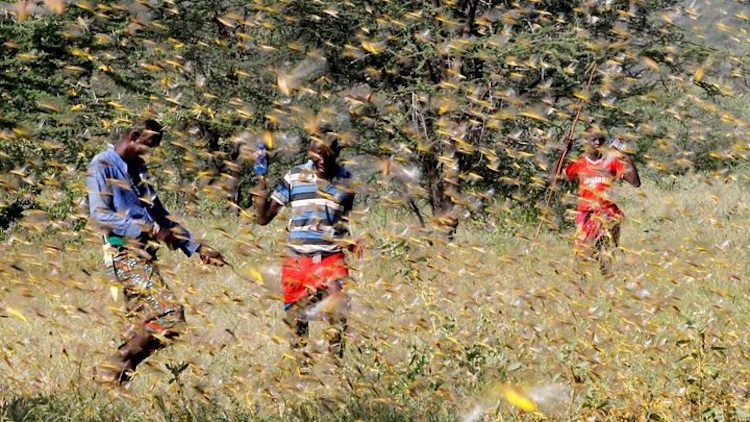Kenya And Somalia Deploy Soldiers To Fight Locust Swarms

After wreaking havoc in India and Pakistan, locust swarms are now heading towards African countries. The situation is so dire in Africa that military contingents are being trained to respond to locusts in countries like Somalia and Kenya.
A team of the Central government has visited Rajasthan’s Barmer district to gather details about the damage caused to crops by locust swarms. According to Barmer DM Anshdeep, this attack by locusts is the most dangerous so far and the state and Central governments can deal with it only when they get together.
Barmer District BJP President Aduram Meghwal said that the locust swarms have caused heavy damage in western Rajasthan and demanded compensation for farmers of Barmer and Jaisalmer, who rely on the rabi crop. Apart from Rajasthan, farmers of Punjab and Gujarat have also been impacted by locust attacks. However, this attack is not limited to posing a challenge for any one country. The situation is so bad in neighbouring Pakistan that locust attacks have been declared a national emergency there. While locust swarms have eaten up all the vegetation in Africa’s Somalia, a separate military squad has been created and is being trained to deal with the menace in Kenya. Warm and dry areas are the ideal breeding grounds for locusts, who can consume lakhs of tonnes of crops. They have the capacity to cover miles of distance. Their average age is 90 days and each day, they can eat food equivalent to their body weight. According to an estimate, a large swarm of locusts can devour as many crops as at least 10 elephants and 25 giraffes. The locust attacks are so horrific that they can cause paucity of food in a country and also leave its economy in a shambles. Locust swarms are currently reported to be 70 km long and 40 km wide and their numbers could increase by up to 500 times after May. There is apprehension that post-May, entire south-east Asia could be at risk of attack by locusts. It is being said that with each passing year, ecosystems across the world are altering due to climate change and its impact is also being seen in attacks by locust swarms. The havoc caused by locust attacks had been witnessed in Russia too in 2017. At that time, fisherfolk there had culled locusts in their nets as food for fish.
Barmer District BJP President Aduram Meghwal said that the locust swarms have caused heavy damage in western Rajasthan and demanded compensation for farmers of Barmer and Jaisalmer, who rely on the rabi crop. Apart from Rajasthan, farmers of Punjab and Gujarat have also been impacted by locust attacks. However, this attack is not limited to posing a challenge for any one country. The situation is so bad in neighbouring Pakistan that locust attacks have been declared a national emergency there. While locust swarms have eaten up all the vegetation in Africa’s Somalia, a separate military squad has been created and is being trained to deal with the menace in Kenya. Warm and dry areas are the ideal breeding grounds for locusts, who can consume lakhs of tonnes of crops. They have the capacity to cover miles of distance. Their average age is 90 days and each day, they can eat food equivalent to their body weight. According to an estimate, a large swarm of locusts can devour as many crops as at least 10 elephants and 25 giraffes. The locust attacks are so horrific that they can cause paucity of food in a country and also leave its economy in a shambles. Locust swarms are currently reported to be 70 km long and 40 km wide and their numbers could increase by up to 500 times after May. There is apprehension that post-May, entire south-east Asia could be at risk of attack by locusts. It is being said that with each passing year, ecosystems across the world are altering due to climate change and its impact is also being seen in attacks by locust swarms. The havoc caused by locust attacks had been witnessed in Russia too in 2017. At that time, fisherfolk there had culled locusts in their nets as food for fish.
#Locustswarms after wreaking havoc in #India and #Pakistan have spread to African countries like Somalia and Kenya, which have deployed soldiers to combat one of the worst infestations @renu_garia #LocustInvasion
— GoNewsIndia (@GoNews_India) February 20, 2020
More @ https://t.co/1jM0gYe7ue pic.twitter.com/4XLwpQx9Rb
Latest Videos
















